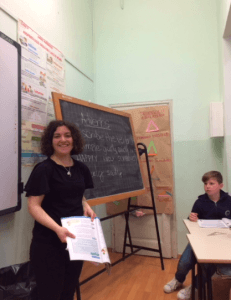
Shapiro taught elementary school students English as past of her education internship (Photo courtesy of Elina Shapiro)
Nathan MckIvor Contributing Writer
“We want our students to have become global citizens when they graduate from here, and what better way to do that than to study abroad!” said Lynne Eustis, UMF’s Assistant Director of Global Education.
While Eustis travels internationally to establish relations between UMF and campuses all over the globe, she does most of her work from her office in the Fusion Center. Eustis is responsible for the mountain of paperwork that comes with international travel. When a student wants to study abroad at another university, they speak to her.
Where is the most popular location to study abroad? “There is none,” said Eustice. “Our students are all over the map.” Students can opt to spend a semester or a full academic year studying at an international university, though they make sure their preferred program complements their major during some of their many conferences with Eustis.
UMF’s direct relationships with international universities includes institutions in China, England, France, Hong Kong, and South Korea. If a student wants to study at an institution in a different nation, UMF partners with third-party providers to guarantee a wide range of opportunities for students. Either way, Eustice coordinates the student’s experience from her office.
“I loved my experience,” said senior Elina Shapiro, who spent a semester in Florence, Italy last year. Studying at the Italian branch campus of Richmond University, she immersed herself in Italian language courses, which were useful for communicating with her host family.
Shapiro’s third-party provider also offered an education internship in the region. Shapiro taught English, science, and social studies at a local middle school while “teaching students struggling with English” in an elementary school.
A memorable moment of her trip? “I got to meet relatives in Rome who I had never met before,” said Shapiro, who is Italian on her mother’s side. Shapiro advises those who want to go abroad to ”start thinking early” and to research “what each provider has to offer,” which is how she discovered her program. Also, Shapiro suggests “practicing the language if the country does not have English as a native language.”
“Oftentimes students don’t look into [studying abroad] because they think they can’t afford it. But there is an affordable program for everyone,” said Eustis. Students can apply their university grants and merit scholarships towards the cost of a study abroad program. Eustis spends time with individual students researching programs of interest them, and often, if one is too expensive, a more feasible program is almost always within reach at a different school.
Roughly 15-20 students study abroad on semester programs each year. Right now, there are two UMF students are abroad: one studying in China; the other spending their semester in France. Checking a spreadsheet, Eustis chirped that 13 more plan to go across the pond in the Spring 2019 semester.
Aside from the traditional study abroad experience, the Office of Global studies also offers a Student Teaching Abroad program for Education majors concentrating in Elementary or Secondary education. As the final component of their majors, they can teach abroad South Korea, Hong Kong, Dublin, and other regions in Ireland.
The department also offers domestic opportunities through the National Student Exchange program for students looking to study at a different university in the U.S.
Wherever a student chooses to study, they are changed by the experience: “Italy will always have a place in my heart,” said Shapiro.